#but also the mythology/symbolism/fate etc etc is taking root in my mind the more i see luffy nika aksjdskdj
Explore tagged Tumblr posts
Text
🌘☀️ Some thoughts on Zoro & Luffy and their connection to gods and demons☀️🌒
This post started at first with just a few points about Zoro in the context to Asura/ King of Hell but since then it somehow evolved into connecting bits and pieces between Zoro & Luffy parallels again, I just can't help it, sooo...long post ahead.
Wano + Egghead spoilers

I always love remembering this one of the very first scenes where we (and Luffy) first hear about Zoro, and in the context of Zoro being a Pirate Hunter, even described as a demonic beast or as Koby says "demon in human form." None of this discouraged Luffy upon hearing this, on the contrary - he thought that if he sees for himself if Zoro was a good guy, he would be a great addition to his crew, and then went out of his way to seek him out! And only later we got the explanation that Zoro just couldn't find his way back home. "Roaming the seas" meant surviving for him, bounty hunter meant getting by in life with the skills he knew the best - swords, which is kind of sad when you think about it, but all the more interesting that it was Luffy who found him in Shells town,
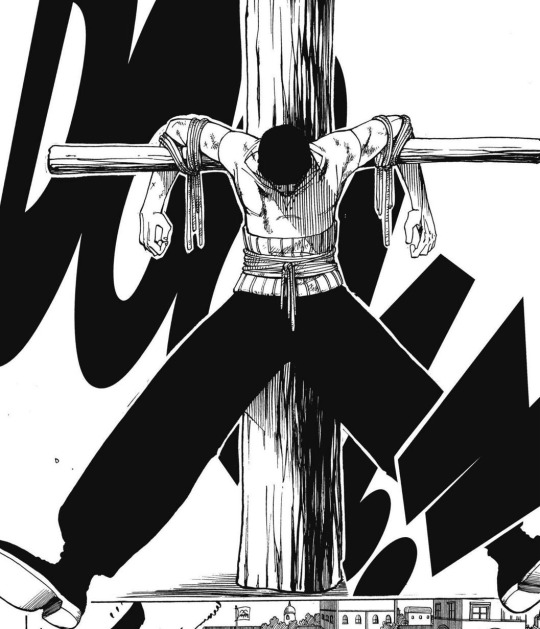
where Zoro, a nonbeliever of any gods of higher power, was bound to a cross, and the first thing Luffy pointed out was "he's smiling".
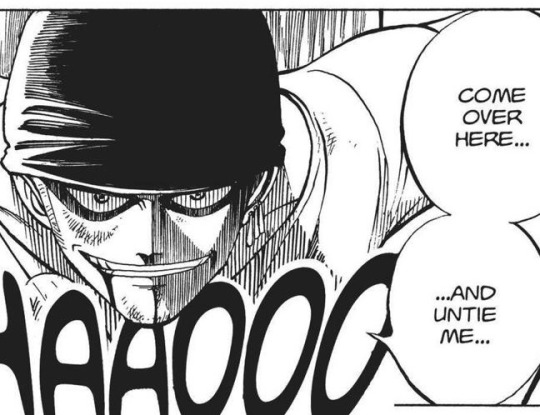
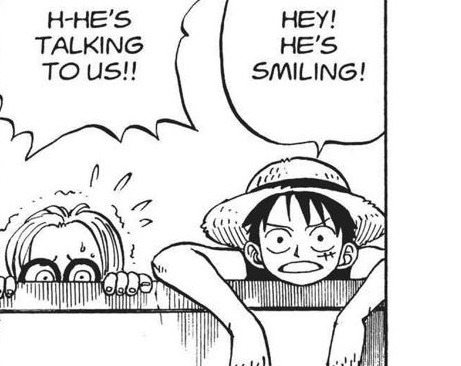
I like to think that the smile might have been one of the first signs important enough for Luffy to choose someone for his crew - not only the kindness that followed when Luffy saw Zoro eating the dirty rice ball, but the smile that's by itself also very connected to Luffy himself:
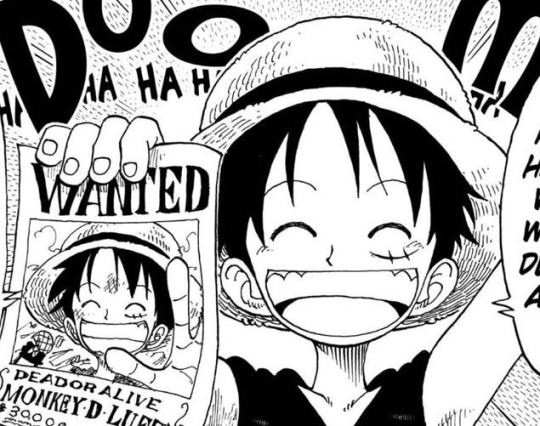

After that first fight they won together, already reading each other so well, Zoro was the first one to call Luffy his captain (and later at Baratie also the first one to call him the future Pirate King!). He was someone who already fully believed in Luffy's future of reaching his dream without questioning it, perphaps because their drive towards their goals and dreams was very similar. And Luffy was the one who freed Zoro and let him have his swords - his biggest treasures - and gave him back the possibility to go into the world to actually follow his dream!
"One day, he'll show up and take you out under the sun, to the freedom of the sea!" - ch. 1095, Buccaneers about Sun God Nika (flashback with Kuma)
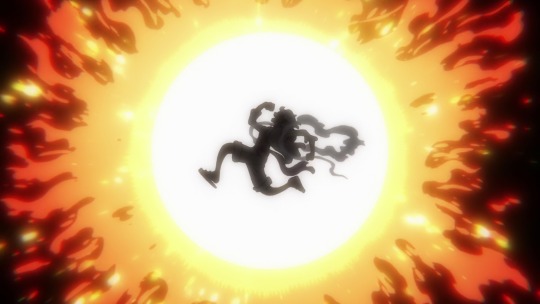
Fast forward to Wano - it's incredible how entangled their stories are with belief in always striving to do better/be stronger/try again next time for Luffy, someone who doesn't care what others think - he just needs to do what he wants and to be free - only for him to awaken his Devil Fruit and his God Nika powers; and for Zoro (a non-believer/apatheist) with how determined he was to successfully wield Enma so he could defeat King the Wildfire even to the lengths of becoming the King of Hell if that was what needed to be done to get Luffy one more step towards being the Pirate King.
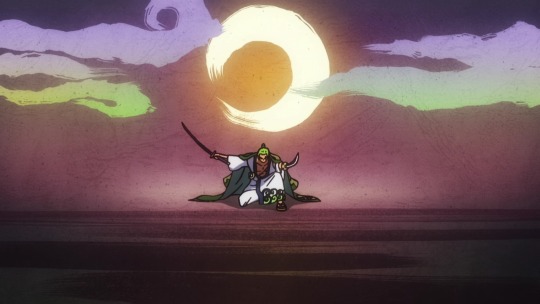
Which brings me back to Demon Asura Zoro and where we saw this form throughout the manga:
This whole post started at first as a parallel to my other post about Zoro not really being shown to react to Luffy's Gear 5 (yet, as of chapter 1109), and I kept thinking about Zoro's Asura technique and how he used it so far only three (!!!) times, and there weren't many reactions from the strawhat crew either.
First one was during the Enies Lobby against Kaku, who even calls that vision 'demon-god' (ch. 417). If I remember Zoro was there by himself with Kaku, his crew each fighting other opponents elswhere:
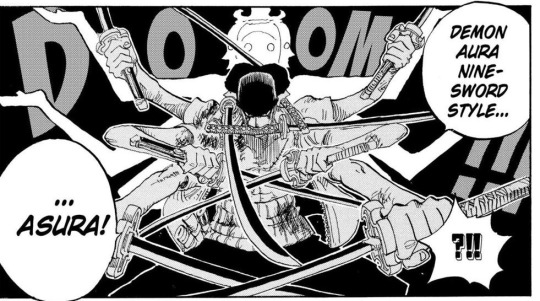
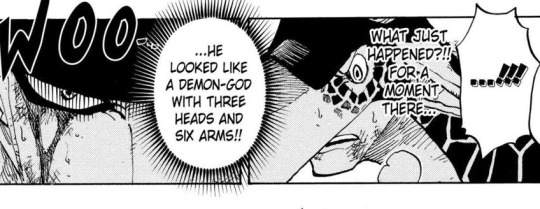
The second time was during their first visit to Sabaody Archipelago, ch. 510, where it was the whole crew against the Pacifistas. The only bigger reactions were Brook and Chopper ("So many Zoros!!" - how cute!)

Luffy went right after Zoro with his last attack against the Pacifistas, so he's either seen Zoro's attack or it just wasn't the time or place to react, which, fair.

and then, third and last time so far Zoro went into his Asura form, it was up against Kaido, ch. 1010, when Luffy was out of it and Kaido was threatening how he would end Luffy in various ways.. which only angered Zoro more ("That's my captain!" - yeah, tell him, Zoro!)

All of these three times we've seen Asura, it was against few of the most dangerous opponents and all three times Zoro had his bandana on, being serious about it. All three of these times he knew his whole crew was fighting for their lives too and were in very real danger. Enies Lobby really changed the tone of the next few arcs with how serious things were about to go; Sabaody was just after Thriller Bark with Zoro being still injured and he knew what Kuma/Pacifistas were capable of - there was real fear and despair. And of course, on Wano against Kaido,. he saw how much damage Luffy took, Zoro could only hope to put more wounds on Kaido to count in their favor.
Zoro knew he had one last attack to try and make some difference in this fight - and this was before his fight with King, so he wasn't fully in sync with Enma yet, but it was good enough to unlock Asura technique - with something more to it.
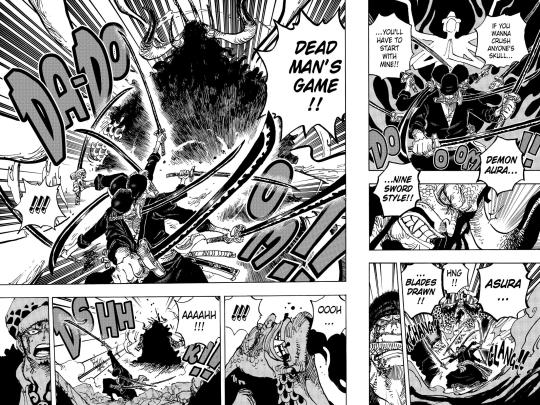
Apparently along with his haki - not just the armament or observation haki, but the supreme king haki, as Kaido himself is shocked to find out. Zoro wasn't even consciously aware of having/using this haki.
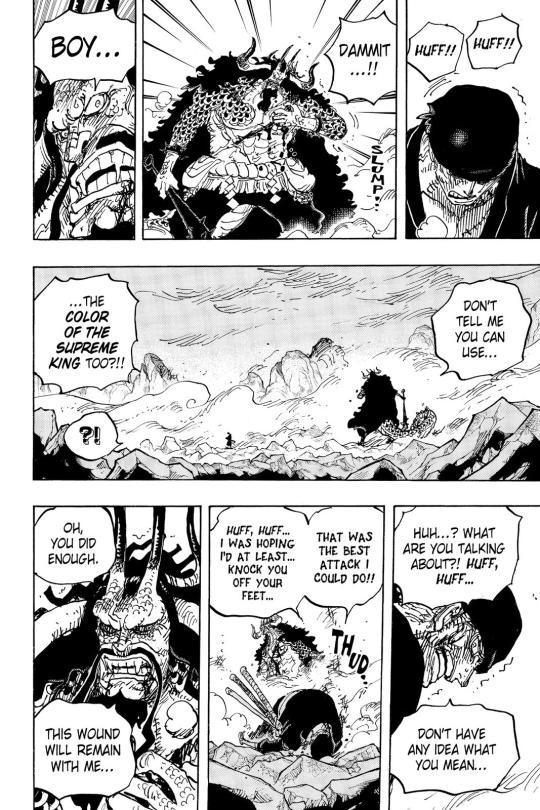
Even the wiki mentions this as Zoro adding the supreme king haki to his Asura attack to strenghten it, or possibly was only able to unlock this technique because of having supreme king haki - meaning he was possibly using it even in both of those pre-time skip situations mentioned above.
The supreme king haki is something people can't learn, but are born with, meaning Zoro probably didn't know until Wano (and still wasn't sure what he did), but possibly learnt to use it instinctively - very much like Luffy on Amazon Lily.)
I already made a post that touched a bit on King of hell Zoro, and other parts around Asura (clearly, i'm never done thinking about that), with a very big possibility/hints that he could come from lineage of people of the D. (asura - enemies of gods - people of D.) - especially if it's connected to supreme king haki as inherited ability (although that isn't confirmed in the manga, as far as I understood).
This brings me to Zoro's family, and specifically Ryuma.
Wano was a great arc that connected things from Thriller Bark -with Zoro returning the legendary sword Shusui back to Ryuma's grave where it belonged.
There was an interesting panel at the end of Wano, where people were celebrating Luffy's victory over Kaido, but were given the name Joyboy as their savior - possibly Momonosuke's doing as Luffy told him not to mention him by name because Luffy didn't want to be a hero.
And in this panel, the peple are comparing this feat of victory to the legendary "God of the Blade" - which is another title for Ryuma.
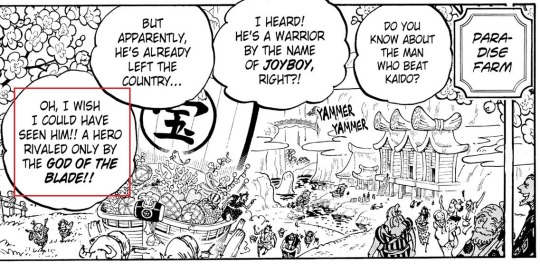
It's so curious how Zoro is connected to Ryuma, even through span of many centuries and countries across, but still there is that connection, on top of actually fighting Ryuma's zombie on Thriller Bark, and Zoro isn't even aware of it. We only know about it from the SBS corner of Oda mentioning Zoro's family. (SBS corner in vol. 105. Ryuma wasn't mentioned there precisely, but the name Shimotsuki being of Zoro's grandmother and others from Wano, it makes sense they're Ryuma's descendants):
Side note: There's also something really beautiful of how the Shimotsuki line was passed down on Zoro from his grandmother - and his promise he cherishes since childhood being tied to Kuina, someone who wanted to be the greatest swords(wo)man - and therefore Zoro carrying Wado and that dream and promise for her.
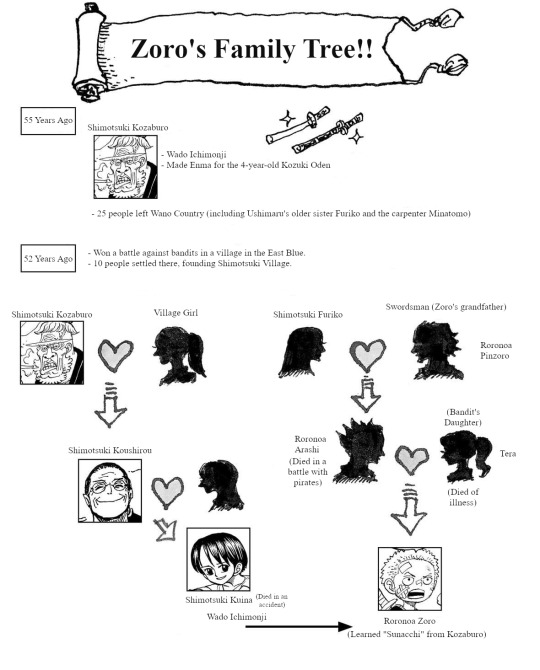
Zoro & Luffy
Now to tie it all back to parallels with Zoro and Luffy - I love that there are always these small moment in how similar these two are - in their honest words and actions, in them believing in one another and believing even more in reaching their dreams, their crew and their strengths. In both being so directionally clueless and sometimes outright stupid, yet in certain situations (more so in battles and fights), they are the ones sometimes smartest and most strategic.
Then there's these other similarities between them: how much they don't care about what's told about them or -be it by luck or fate- how things work out in their favor in the end, usually. How both of them don't wish to be heroes, because heroes had to share (food and sake).
How there's that fact that Zoro doesn't know the full context of his powers, especially with his supreme king haki- or that he doesn't want to know the truth or put a name to that ability, because he fights with his swords and doesn't need to put belief of any other powers beside his own strength. (Or maybe he will soon learn how to use it to his (and his crew's) benefit.)
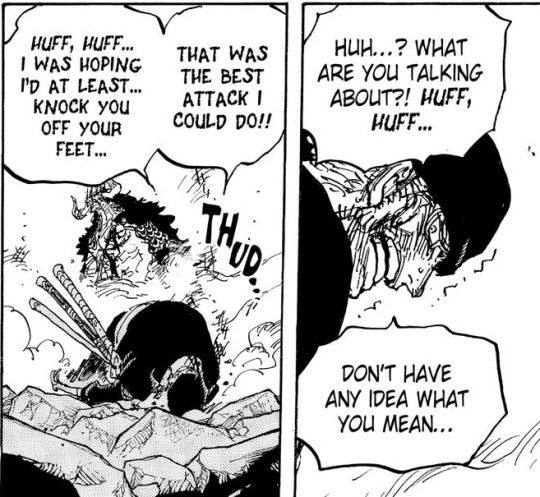
and Luffy, who doesn't know probably anything about Nika- and most likely wouldn't care much about them beside the scope of his new powers. The whole meaning of being something like "sun god" for others didn't register with him yet, and it might never be that important to him personally. Time after time, people around him mention luck or fate, or how people of the D. are the enemies of the Gods - enemies of the celestial dragons, but those don't really matter to Luffy because it doesn't change why he fights and why he needs himself and others to be free and achieve his dream.
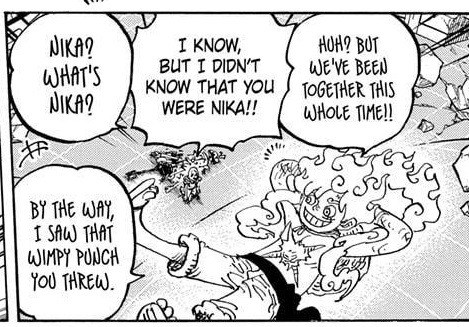
How Zoro and Ryuma could be parallels to Luffy and Joyboy - one living in the present, reminiscent of those that lived centuries ago - something about the history always repeating.
When Zoro got to fight Ryuma on Thriller Bark, or even Hyogoro compares him to Shimotsuki Ushimaru (Zoro's great uncle),
and how Zunesha was waiting for Joyboy, how Roger and Oden found messages from Joyboy of his promises to return.
The parallels between sun god Nika and demon god/king Asura are so interesting in their opposites yet similarities. There's still so much we don't know about Nika or Joyboy, but Luffy himself isn't just the perfect picture of responsibility or justice. He's free, and that's the most important for him. He now has the power to do what he really wants to do with his powers, he unlocked that new potential to make it even more fun and even more dangerous against his enemies.
Even if Zoro's saying he doesn't believe in higher powers he embraces the powers that unlocked with Enma and getting him the title of King of Hell, he knows it would be the things that would keep him fighting for another minute, hour, day when it becomes necessary to protect Luffy and their crew.
Zoro may not believe in any gods but he believes in Luffy with all his being.
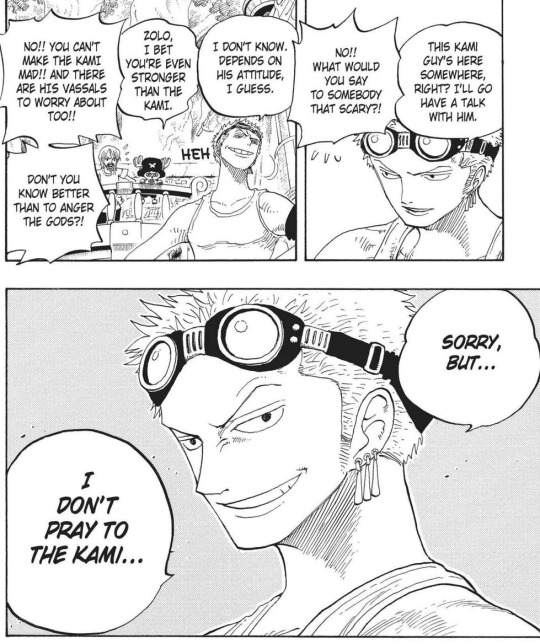
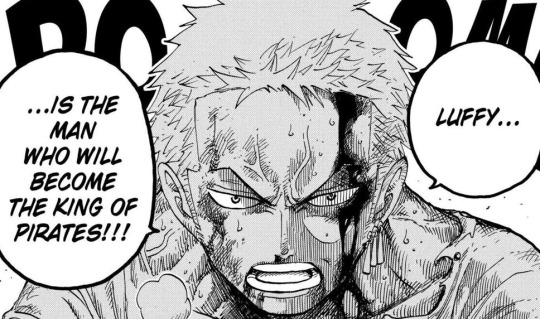
And in the similar vein, Luffy is the one who always believed in Zoro's strength and capability to protect the rest of their crew when it was necessary, times after time.
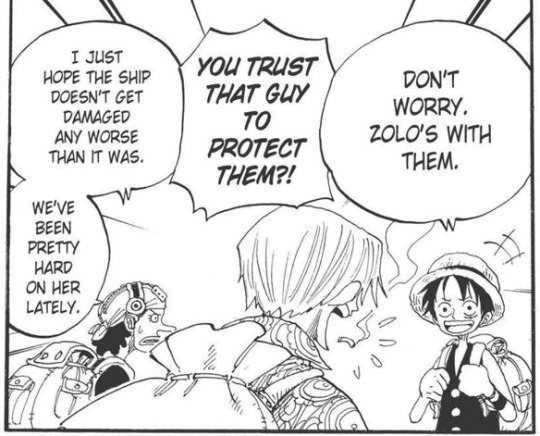
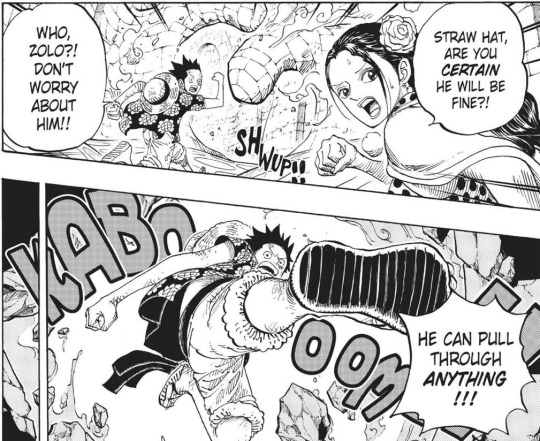
It's feels like it's not at all a coincidence that Luffy's whole crew is full of otherness and beings connected to hell/monsters/demons more than anything divine - because lot of the gods in One Piece are mentioned in context of standing above others and above common people - it's a bit flipped of what's good or not, or even more it's never clear because that's life, and those people are just claiming some titles. Eneru being the first example of a "god" the Straw Hats encountered, celestial dragons being called Gods, the Gorosei having each titles of "Godhead" - it's no wonder that Luffy's crew all fights for freedom and reaching whatever each of them needs to achive as their dream,
and includes: a dead man but living skeleton Brook; a demon child Nico Robin; Chopper "I don't mind being a monster for Luffy.'"; Sanji with all his hell fire and "diable" kicks and attacks, along with his non human strength and other abilities; Nami wielding the powers similar to Eneru without the need of both Devil Fruit or being called a goddess, and bringing down lightning on anyone who threatens her crew; Usopp and his powers of nature and plants sprouting new life and strengths from long distance; Jimbei - fishman and former Sun Pirate and also "First son of the Sea"; Franky the more cyborg than a man; and of course, Roronoa "I might as well become the King of Hell" Zoro.
It's not all so black and white, good or bad. Luffy is still everything that makes him Luffy - he's honest and selfish in his selflesness, kind and brave and stubborn, and always knows that Zoro (and his whole crew) has his back so he doesn't have to hold back.
And Zoro is still Zoro despite being able to wield some newer haki powers he's slowly discovering now. He's still getting lost and still is his stubborn self that puts the crew and Luffy above himself, and would follow Luffy into hell if that was needed.
Luffy and Zoro are "just" captain and his first mate, always throughout the story since the beginning. Orphans with such interestingly woven past and relationships around them, who grew up with a big dream they had to go and achieve it no matter what, and found someone just as honest, kind, powerful and trustworthy as they were. But there's that deep and fierce devotion that always borderlines on something beyond just good. They're pirates - because that means being free.
They can be chaotic and powerful, and find something divine in the loyalty of the demonic powers, and something hellish in the god-like entity bringing freedom.
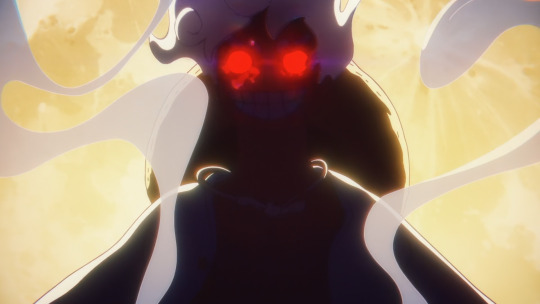
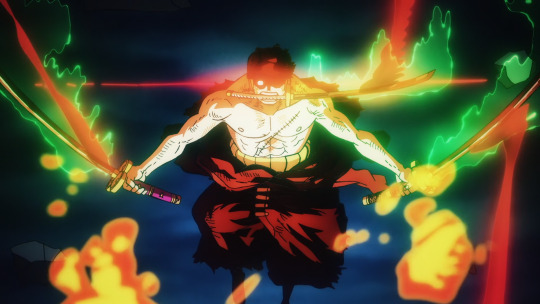
It feels like something Roger said to Rayleigh when they first met - That it was a fated meeting.
#roronoa zoro#one piece#asura zoro#monkey d. luffy#zolu#luzo#zoro's never believing in any gods or higher power vs luffy crashing every reality by his mere existence. zoro: oh. OH#on one side im like: i just want them to be zoro and luffy. and that's enough#that's who they are#but also the mythology/symbolism/fate etc etc is taking root in my mind the more i see luffy nika aksjdskdj#monkey d luffy#luffy#mine#gif:zolu#gif:op meta#gif:op manga#one piece meta#gear 5#sun god nika#demon king zoro#zoro king of hell#shimotsuki ryuma#joyboy#wano#wano spoilers#egghead arc#egghead spoilers
359 notes
·
View notes
Text
Kenny Reacts to: Ramayana (& Hindu Mythology in General)
So, for those who don’t know, “Ramayana” is one of the big epics of Hindu Mythology, comparable to the Illiad or other legendary Kings such as David or Arthur, centering around Prince/King Ramchandr, one of the Avatars of Vishnu
My boyfriend (who happens to be Indian) introuced me to a TV show based on it, and I, being a mythology nerd, couldn’t resist...
Since a lot of people actually believe in this as a religion, first a disclaimer: I’m a complete atheist with no belief in the supernatural whatsover, but I’m a huge believer in the value of storytelling (and a writer - the more mythological references the better, at least if you’re aiming for as much of an ‘universal’ flavor as possible) and do hold that myth holds an important place in the human experience. I will be approaching this completely from a literature perspective.
My boyfriend is not a believer either, though he used to be an actual Hindu growing up & still has it as a cultural background (I know myself that the stories you’re brought up on do influence you just by the archetypes and poetic shorthands they make available to you) - apparently he found it quite interesting to see me react to it & see it properly from start to finish. (though it has actually caused a resurgence in childhood song earworms)
So, with that out of the way, let’s get to the actual “review”
What did I watch
It’s a somewhat older show from the 80s or 90s so the special effects could have been better - but I say that only because with a concept like “Demons versus monkey people” and “battles with dark sorcery and vaguely described divine weapons” there is a lot of potential for creative visuals.
In this implementation the style of costumes was more “historical” overall, but great care was taken nonetheless.
Indeed, though childhood nostalgia filter my boyfriend likes this particular version because it was made by an 80 year old dude who dreamt all his life of making a TV show out of this story & worked hard to make everything ~just right~ - there have been never, fancier interpretations since but they tend to be more generic & plasticy in terms of the actual screenplay (my boyfriend, though biased by childhood exposure, says that “You don’t get the feeling that you’re looking at Ram, you’re looking at a supermodel”) whereas in this one, the director took great care to write all the songs & handpick the actors -
Which, with those mythical, ‘archetypical’ characters is quite important, they have to have the right ‘aura’, ‘presence’ or ‘atmosphere’ around them to connect to the larger-than-life timeless ideas they’re intended to embody. They made sure to cast tall, wry dudes as the monkey people, had some really good acting, made sure supposed relatives actually look alike etc.
This adaptation (at least insofar as I’ve watched it) seems to have gone with the “good ending”, that is, the version where the Prince & his wife live happily ever after returning to their home city (for a change, the original/older one... though it makes little sense to debate about the true version of a myth, it’s their very nature to be passed around & reinterpreted and for each listener & reteller to put their own spin on it) - there’s a second one that’s much more anal about social divisions, harder on the mysoginy and ends with him disowning her ass, though there’s some ring to the idea of the Princess returting to whence she came (mother Earth) in humiliation. It depends on what sort story you want though it doesn’t seem to fit with Ram’s characterization as the type who always looks to resolve things peacefully & reasonably & think before acting, & he may lose some of what makes him interesting if you take that away.
Indeed the director saw the need to sanitize even the orginal “chastity test by fire” scene - more than I would have done even if I wanted the Prince to keep looking heroic, I suppose, a lot like how many Christians will explain away many inconsistencies in the bible (and pretty much everything in the book of Judges) because they need their headcanon to be consistent with what they associate with the deities.
The Cosmology
One of the interesting parts about this particular ‘verse that got me more interested in it beyond my initial watching of that show is the rather complex makep of the world -
In most places religion has gone though certain discrete stages in accordance to the civilization that thought it up, with the various ideas (animism, polytheism, dualism, monotheistm etc.) all influecing each other subtly by the need to react to each other but in this case you had this evolution happening gradually without the previous being completely discarded.
So you have river spirits, sacret trees, elemental monsters, demons, titan/jötnar like entities, your basic greek style deities, a big head honcho lord of the universe, concepts of self-enlightenment and pantheist universal unity all coexisting in the same setting.
It’s basically a religion kitchen sink. (and I mean that in a good way, though I get why some may prefer the more ‘streamlined’ ideas of modern Christianity or Islam)
Impressions & Surprising things
Very interesting - because of my familiarity with mythic universals & certain shared cultural roots ( They even have their own wandering handsy thunder god! - though he’s squarely in the middle of the cosmic hierarchy and seems to be the designated Worf Effect recipient) , I could count down all the tropes and see a lot comming but because of different cultural ideals there were many points where I REALLY didn’t know what was going to happen next
Also, it was a veritable soap opera and I did not expect the feels. The heroes were more adorable than I’d ever have thought.
The level of “Honor Before Reason” and “Because Destiny Says so” is about comparable to the ancient greeks, but the “humble sinless all-loving hero come to earth for an ardurous mission” might remind one of Jesus, especially in the conception that “The Hero”, in the most archetypical sense, is to be not just badass but moral - though rather, Jesus resembles Ramayana because Ramayana came several centuries first; Just a sign IMHO that there myths come from the human mind and humans everywhere are more similar than different.
Funny thing is, since christian apologetics have this complex to prove how “special” their religion is (I mean it is unique in that no one has the exact same combination of traits but that’s true of every religion and the elements are universal), they spend a lot of time dismantling Islam (often with bonus racism) but usually completely dismiss Hinduism because “Well, they’re polytheists” when the two religions actually have a lot of ideas in common - indeed a lot of beievers will speak of the Hindu Trinity (or their favorite part thereof) or the Mother Godess much like the average dualist or monotheist would talk of their god, like, “O supreme being that dwells in all goodness” etc.
Unlike Jesus (who, despite his popular interpretation, in the original bible had quite a temper) Rama’s patience & forgiveness is a bit less of an informed ability, though you do get the sense that this comes from a warrior culture as well as a very stratified society where living up to your given social role (including that of a wife) is everything - in a Western work Ram probably would’ve seized the city with the support of the citizens. XD
One could comment that Ram & his brothers are still royalty & that the focus is on that whereas Jesus deliberately took the shape of an ordinary dude, though Ram still gets to spend years as a hermit & Jesus is still convolutedly made to be descended from David - the Jesus myth being the way it is probably has more to do with the political circumstances of its origin (conquest by rome) than the nobler meanings ascribed to it later.
Another, subtler/ less apparent aspect of the destiny trap thing is that if everyone has their fate, no one can be blamed all too badly. (Deathbed redemptions galore) Nonetheless, as the prover goes, “karma is a bitch” and these people invented it.
That said, tough still a simplistic story (that purtports there’s only one clear universal law everywhere and that the good guys always win - That’s an air castle if there ever was one, we need to work for that) I was actually surprised by the sophistication of morals & politics at times, it went into specific questions (hypocrite accusations, hypocratic oaths, how to charioteer, what a good king should be like etc. )
This is probably an artefact of being written from the PoV of royals & warriors, or just an indication of the great asian civilizations having existed so long & relatively unbroken compared to the many shifts in where things where going on in the nothwest.
This is the first time in ANY mythical story that I’ve seen anyone raise the concern of preserving the innocent citizens of the enemy faction and how to stabilize the political situation afterwards (after dethroning the local evil overlord, they put in his turncoat brother who joined the good guys for damage control), something that I haven’t seen a SINGLE time in the Bible (and I’ve read the whole thing), though the heroes steer clear of the line to “simplistic stupid good” if you discount the “honor before reason” parts.
There’s 4 ways you can do ‘archetypical’ characters: Wholly & completely stick to the simple archetype, bring the archetype to full circle & detail while milking it for maximum symbolism, “not what they seem/contrast” and giving them depht without having them ever stop to be their archetype - it’s the latter that was done magnificiently here, especially in terms of 3Dimensional antagonists, they have enough redeeming qualities for it all to strike you as a tragic waste of life, but not enough to let go of their pride and avert the divine punishment.
(The “wicked cultured” Dark Sorceror Evil Overlord being interesting is a given, but of all characters, the cocky big mouthed Demon Prince was the last one I expected to have hidden dephts)
1 note
·
View note